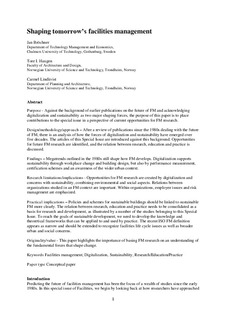| dc.description.abstract | Purpose – Against the background of earlier publications on the future of facilities management (FM) and acknowledging digitalization and sustainability as two major shaping forces, the purpose of this paper is to place contributions to the special issue in the perspective of current opportunities for FM research. Design/methodology/approach – After a review of publications since the 1980s, dealing with the future of FM, there is an analysis of how the forces of digitalization and sustainability have emerged over five decades. The articles of this special issue are introduced against this background. Opportunities for future FM research are identified, and the relation between research, education and practice is discussed. Findings – Megatrends outlined in the 1980s still shape how FM develops. Digitalization supports sustainability not only through workplace change and building design but also through performance measurement, certification schemes and an awareness of the wider urban context. Research limitations/implications – Opportunities for FM research are created by digitalization and concerns with sustainability, combining environmental and social aspects. Relations between organizations studied in an FM context are important. Within organizations, employee issues and risk management are emphasized. Practical implications – Policies and schemes for sustainable buildings should be linked to sustainable FM more clearly. The relation between research, education and practice needs to be consolidated as a basis for research and development, as illustrated by a number of studies belonging to this special issue. To reach the goals of sustainable development, we need to develop the knowledge and theoretical frameworks that can be applied to and used by practice. The recent ISO FM definition appears as narrow and should be extended to recognize facilities’ life-cycle issues as well as broader urban and social concerns. Originality/value – This paper highlights the importance of basing FM research on an understanding of the fundamental forces that shape change. | nb_NO |
